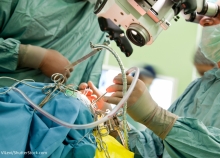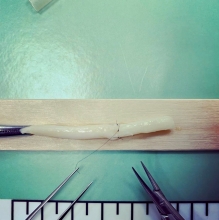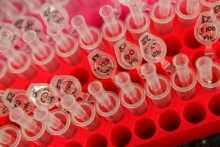McGill researchers identify new markers for early detection of cervical cancer
By Ashley Rabinovitch

McGill researchers identify new markers for early detection of cervical cancer
By Ashley Rabinovitch

By Monica Slanik, School of Physical and Occupational Therapy

Open source app helps predict brain tumour malignancy and patient survival
The power of artificial intelligence (AI) in medicine lies in its ability to find important statistical patterns in large datasets. A study published today is an important proof of concept for how AI can help doctors and brain tumour patients make better treatment decisions.

New technique could be used to choose best therapies for patients and measure their effectiveness
Evaluating the effectiveness of therapies for neurodegenerative diseases is often difficult because each patient’s progression is different. A new study shows artificial intelligence (AI) analysis of blood samples can predict and explain disease progression, which could one day help doctors choose more appropriate and effective treatments for patients.

McGill researchers’ findings show that may be the case

Humanizing Patient Care
Dr David Hornstein's ICU Diaries Project appeared in La Presse on 22 December. Read more!

Insight into way enzymes work could shape future therapeutic production
Researchers at McGill University’s Faculty of Medicine have made important strides in understanding the functioning of enzymes that play an integral role in the production of antibiotics and other therapeutics. Their findings are published in Science.

Researchers identify path to improve HER2+ breast cancer susceptibility to approved therapies

Food can trigger overconsumption similar to alcohol and drugs, but it is not the whole story
A large analysis of personality studies has found that people with obesity behave somewhat like people with addictions to alcohol or drugs. But obesity is also a complex condition that cannot be fully explained by the addiction model.

Adoption of methods that could reduce costs and spare animal models
Microsurgery is an intricate and challenging surgical technique that involves using miniature instruments and sutures as fine as a hair strand aided by sophisticated microscopes. In plastic surgery, microsurgery is used to repair small damaged vessels and nerves following trauma, or in reconstructive procedures by moving a component of living tissue from one place of the body to another and reconnecting its vascular supply to this new region to keep its blood supply.

Scientists demonstrate flaws in protein detection tools, and outline a solution
A new study points to the need for better antibody validation, and outlines a process that other labs can use to make sure the antibodies they work with function properly.
Antibodies are used in laboratories and clinics to study proteins, which are the biomolecules that translate information from an organism’s genes into the structure, function, and regulation of its tissues and organs. Genetic mutations can cause protein imbalances or malfunctions, leading to human disease.
TITLE: Augmentation of cell numbers and function in the immune system by in vivo administration of North American (NA) ginseng (Panax Quinquefolium): Assessment in normal and cancer-bearing infant, juvenile, adult and elderly mice

Title: Fibulin-4 exerts a dual role in LTBP-4L–mediated matrix assembly and function

Montreal, September 23, 2019 – According to a recent study published in Proceedings of the National Academy of Sciences of the United States of America, the biological clock influences immune response efficacy. Indeed, CD8 T cells, which are essential to fight infections and cancers, function very differently according to the time of day. The study was carried out by a team of researchers led by Nicolas Cermakian, PhD, of the Douglas Research Centre, and Nathalie Labrecque, PhD, of the Maisonneuve-Rosemont Hospital Research Centre.

McGill University is participating in a new research project titled Tête première (head first), led by the team of neuropsychologist Dr. Louis De Beaumont, a researcher at the CIUSSS du Nord-de-l’Île-de-Montréal research centre and a professor in the Department of Surgery at Université de Montréal. The project will assess the brain’s capacities to sustain blows to the head during a full university football season.